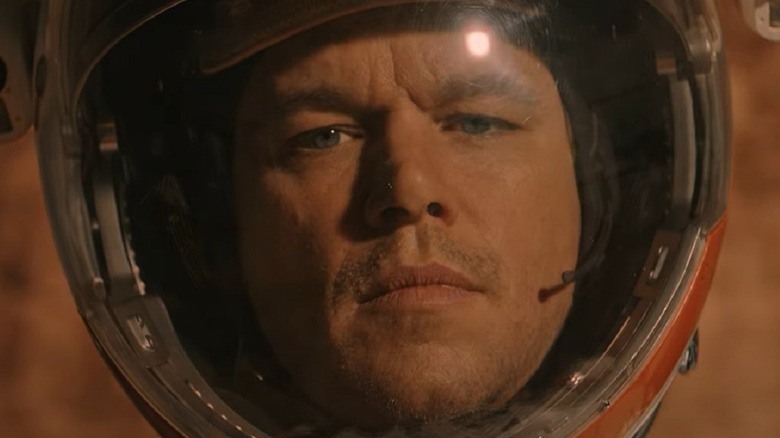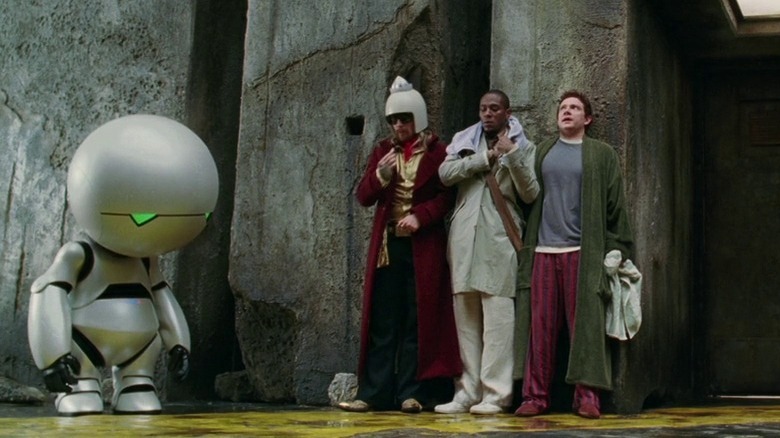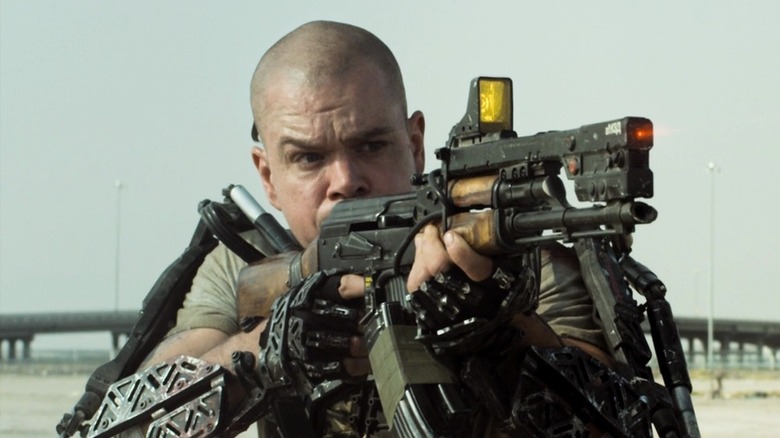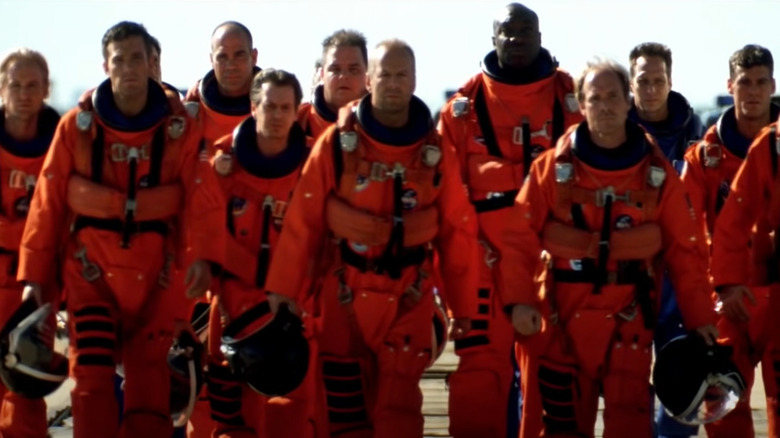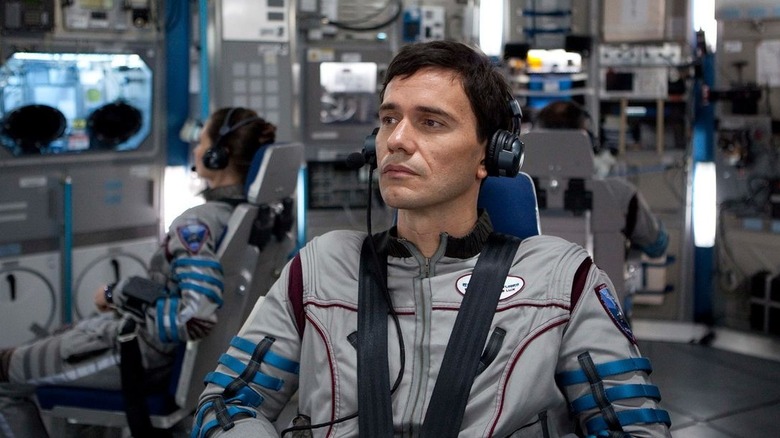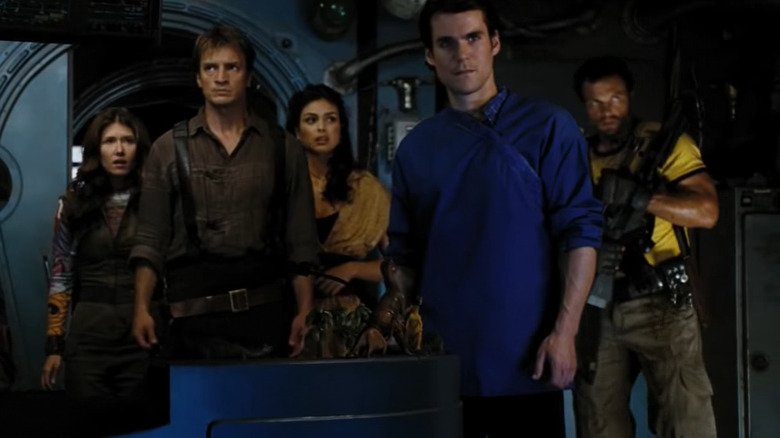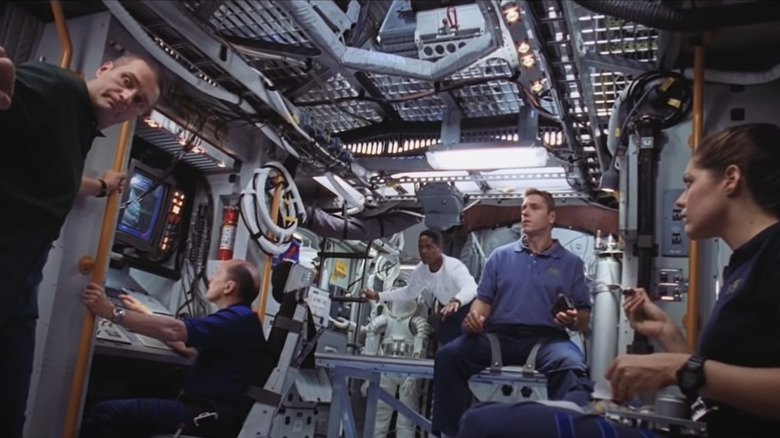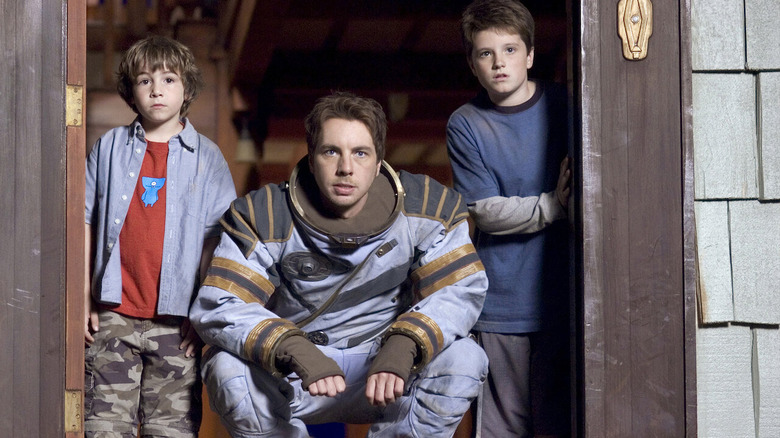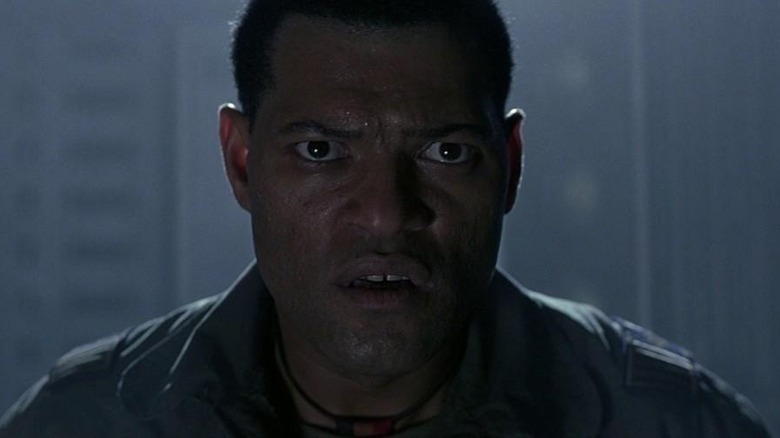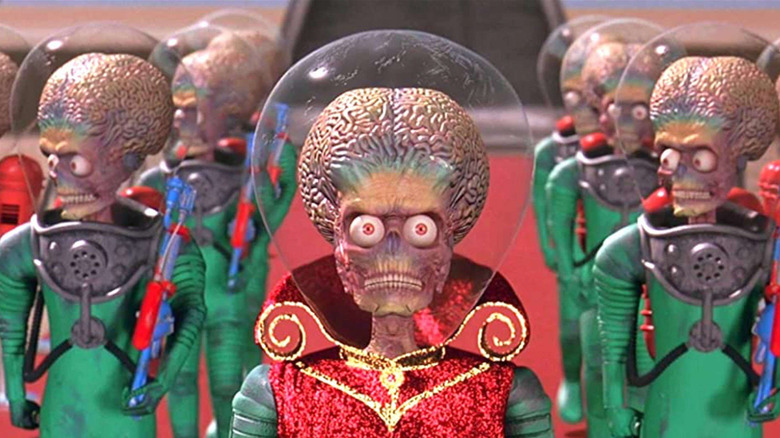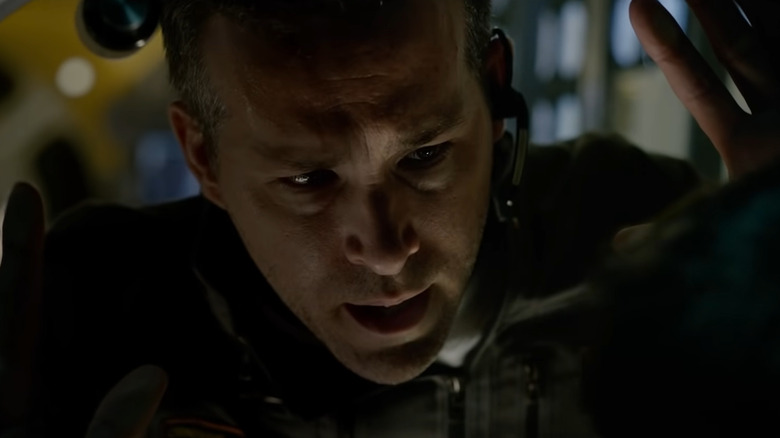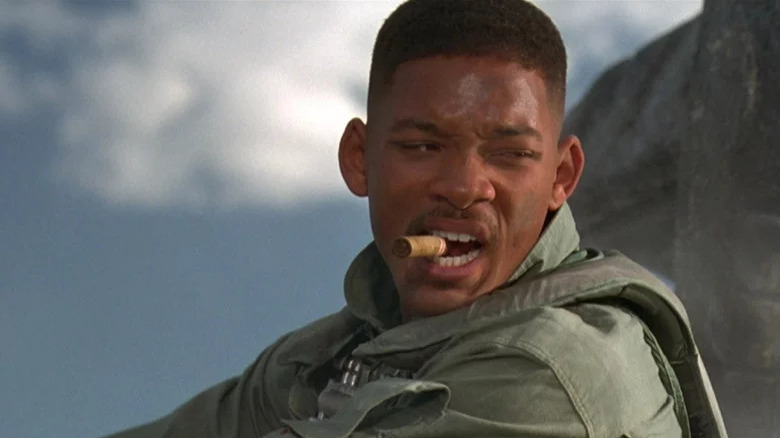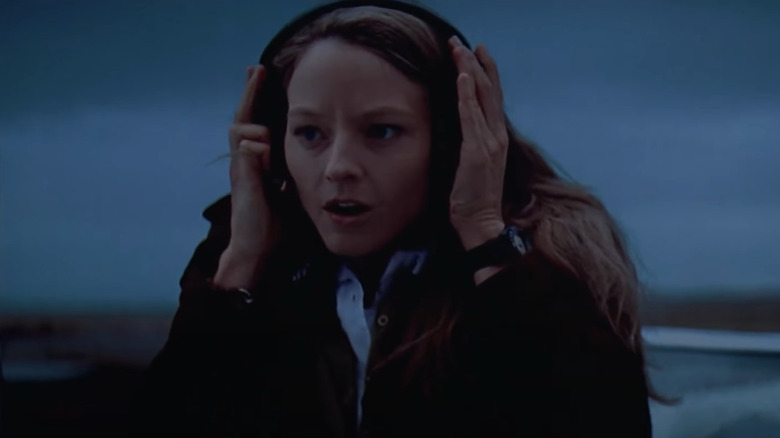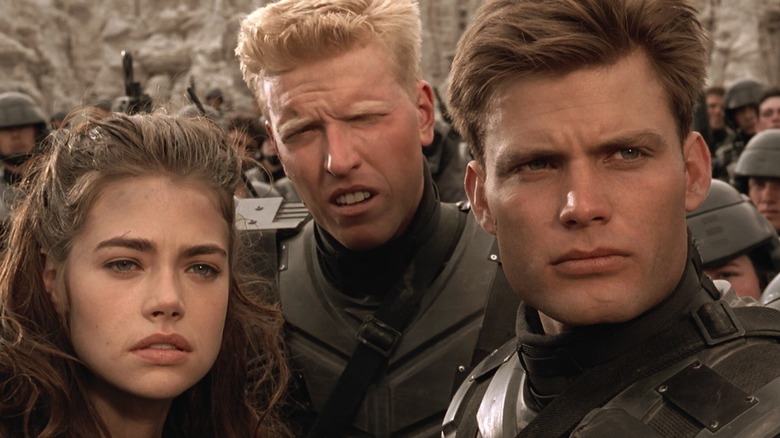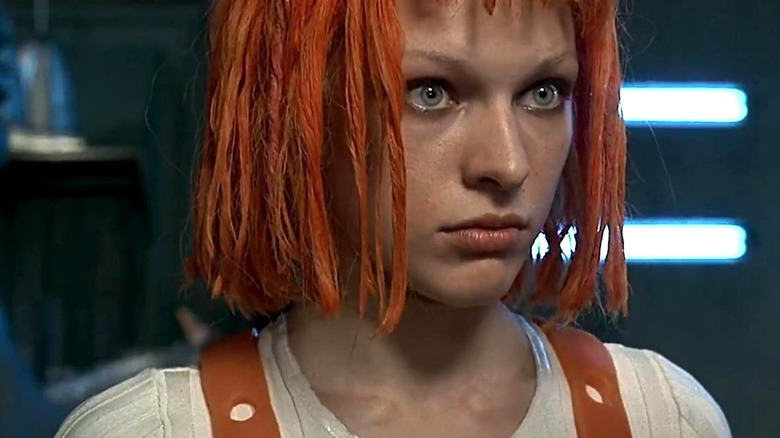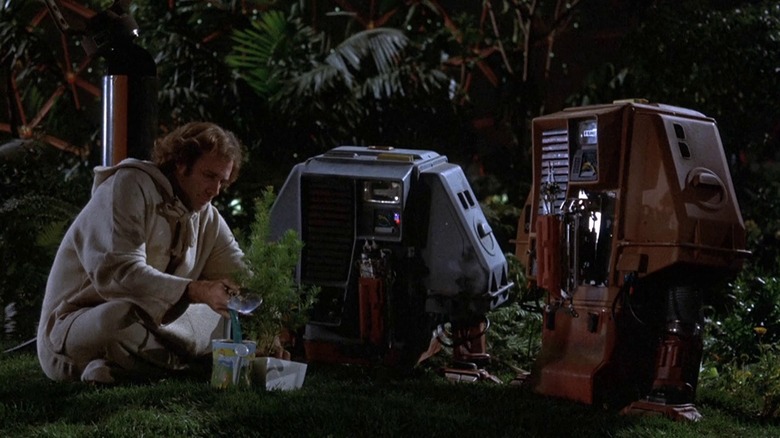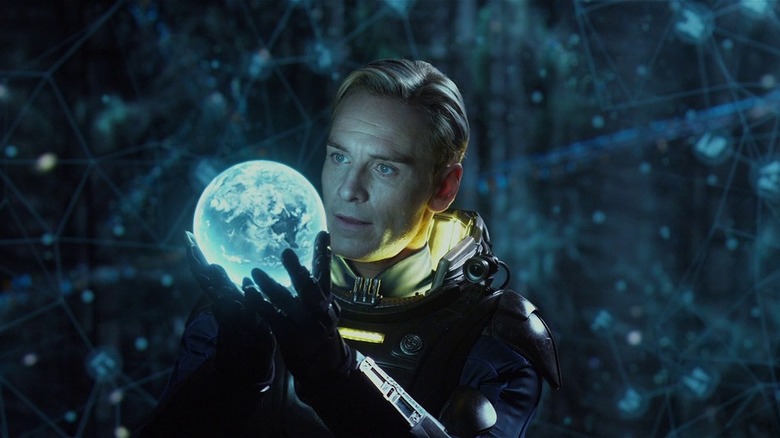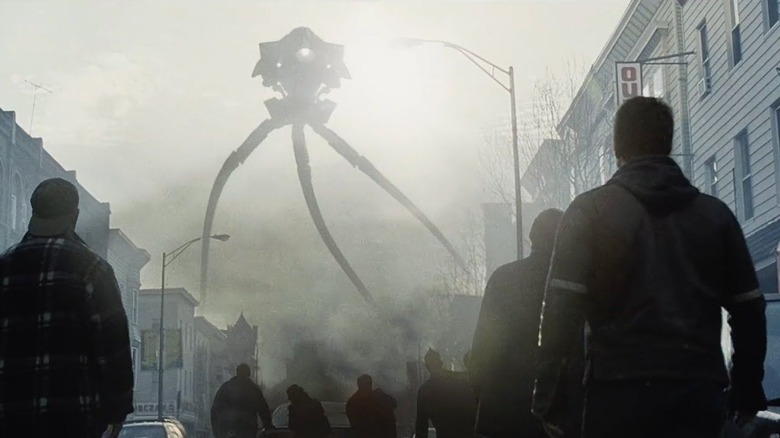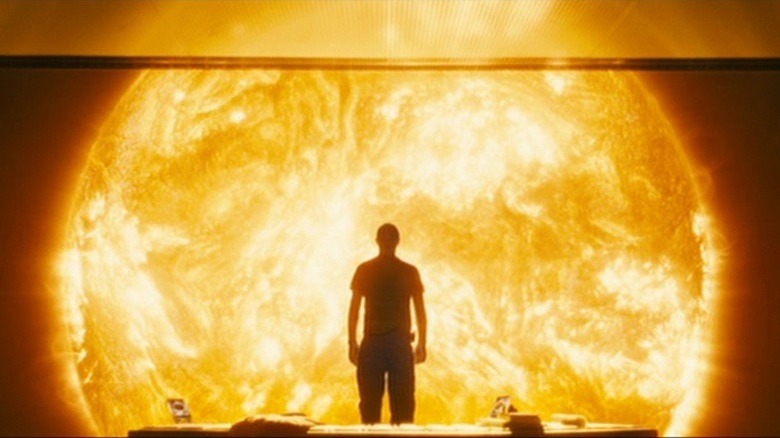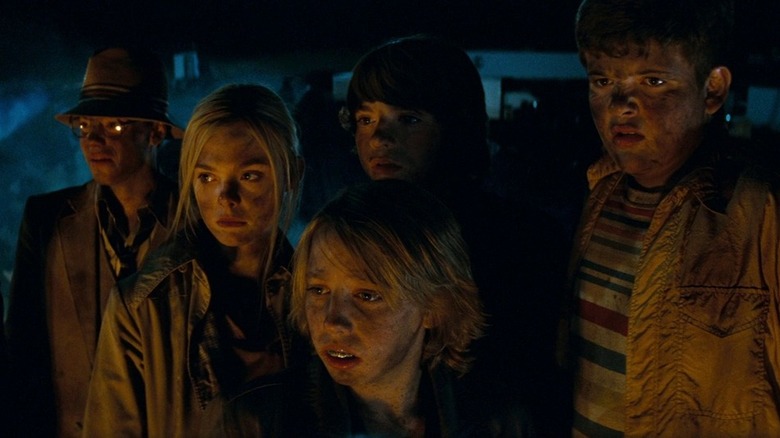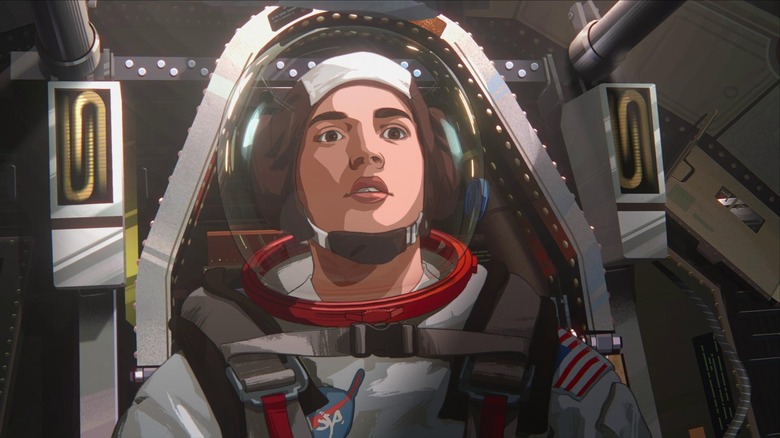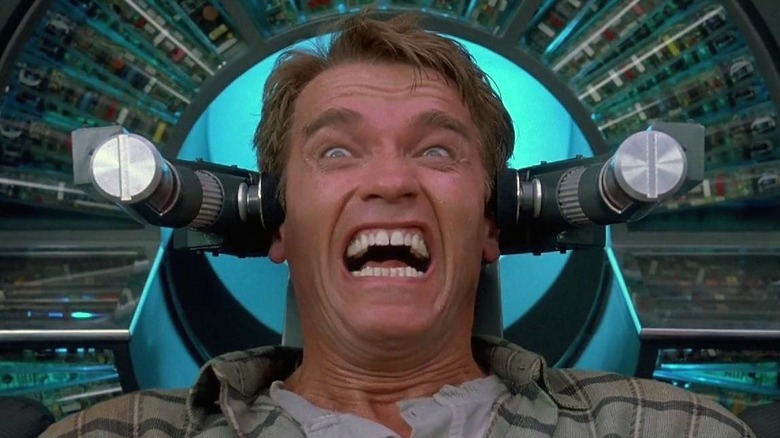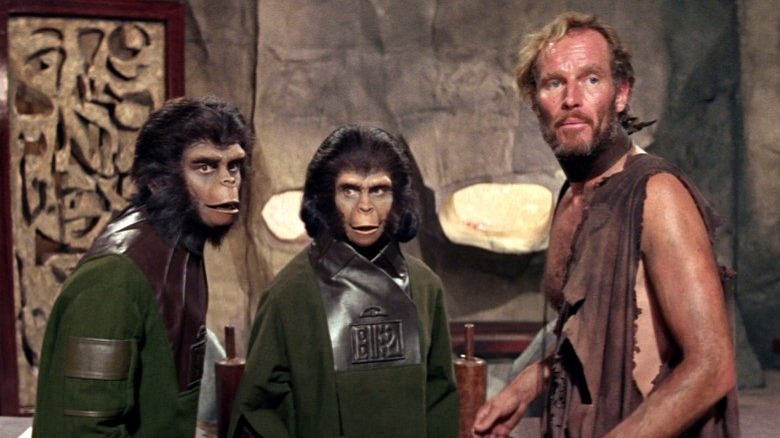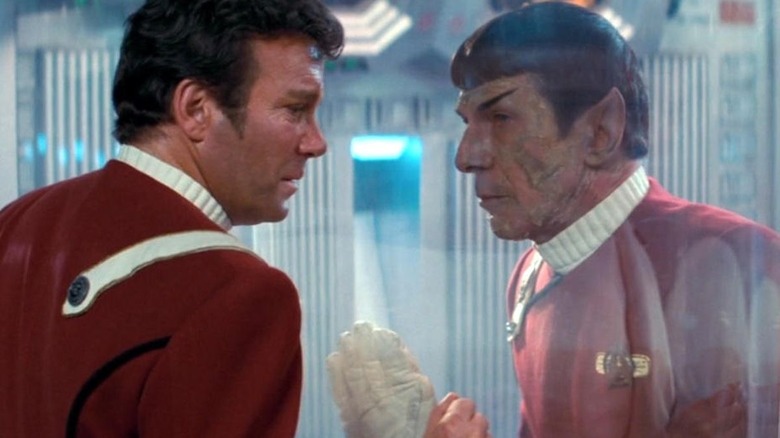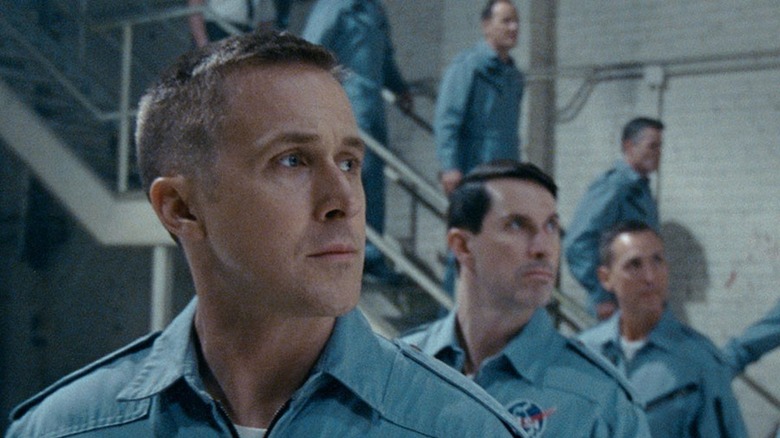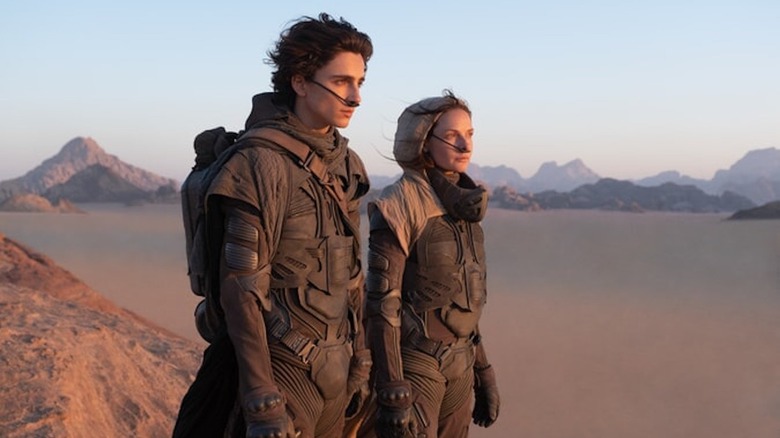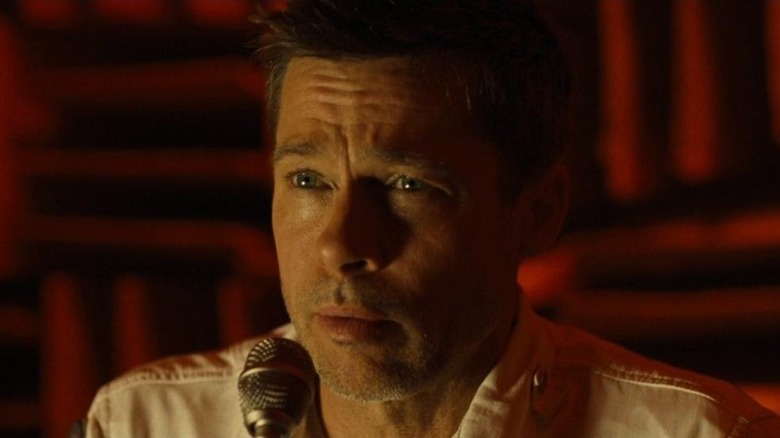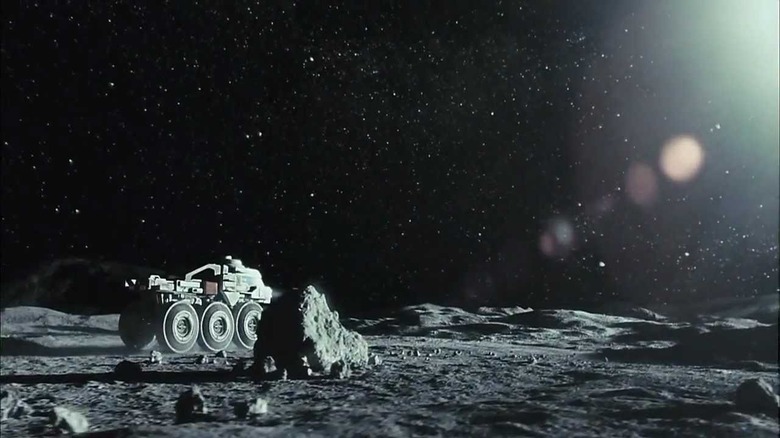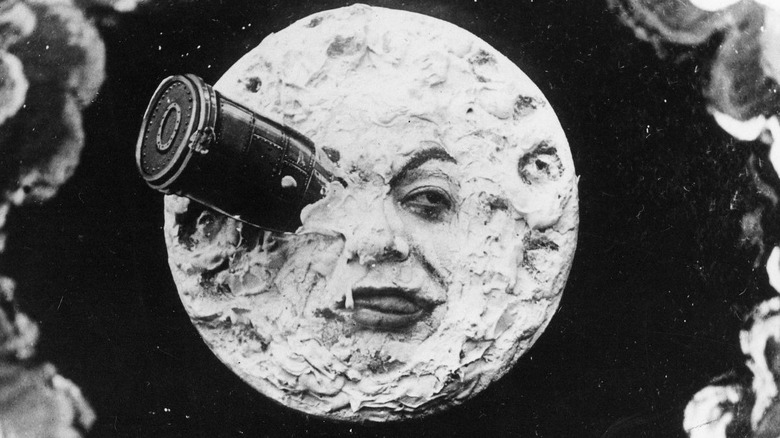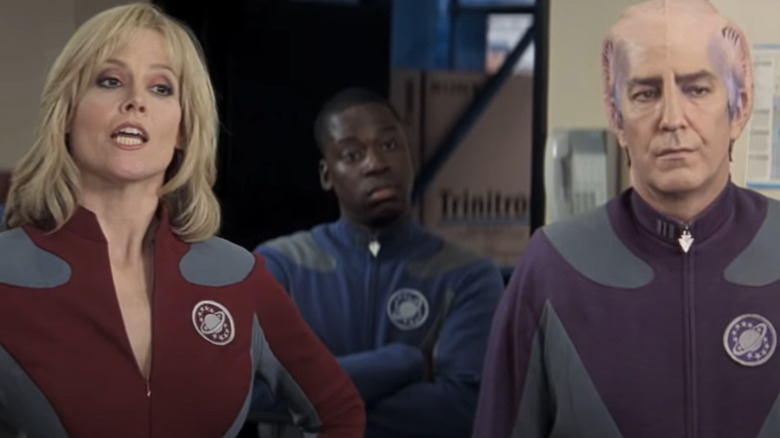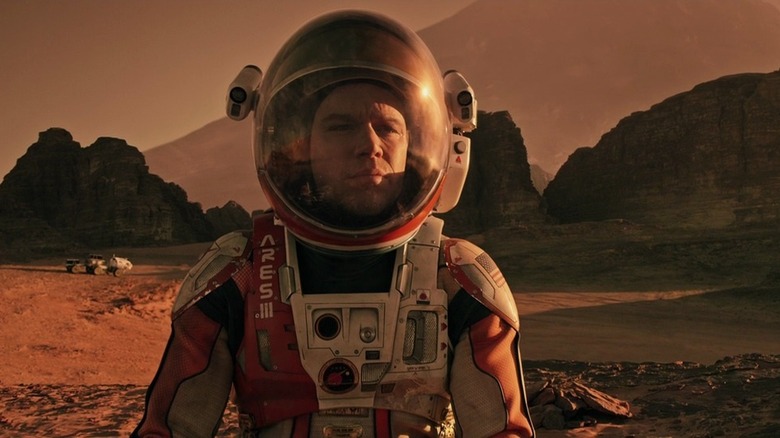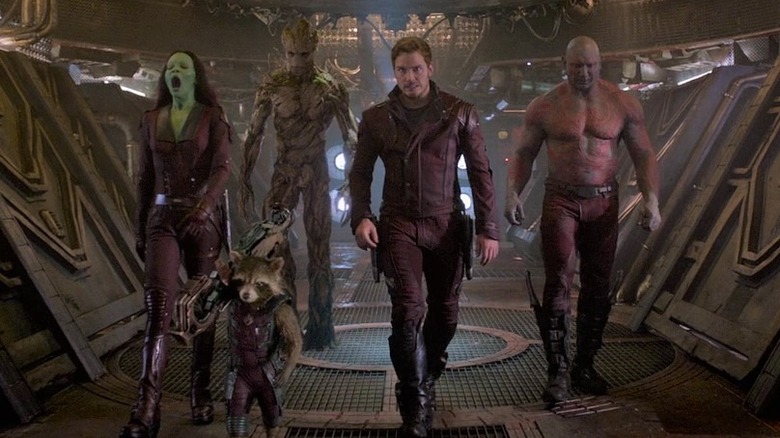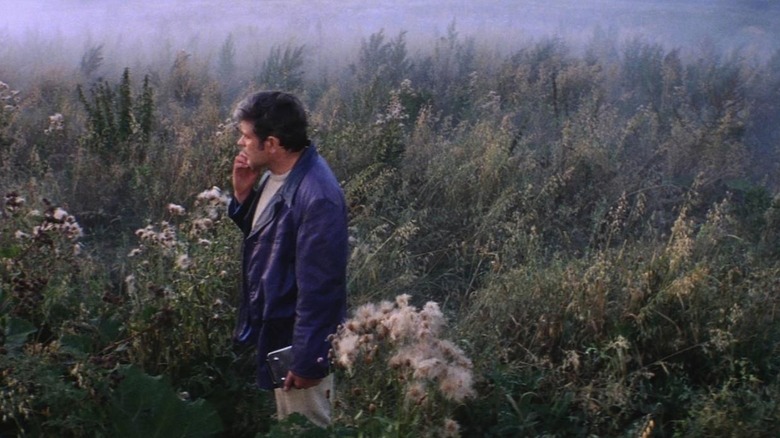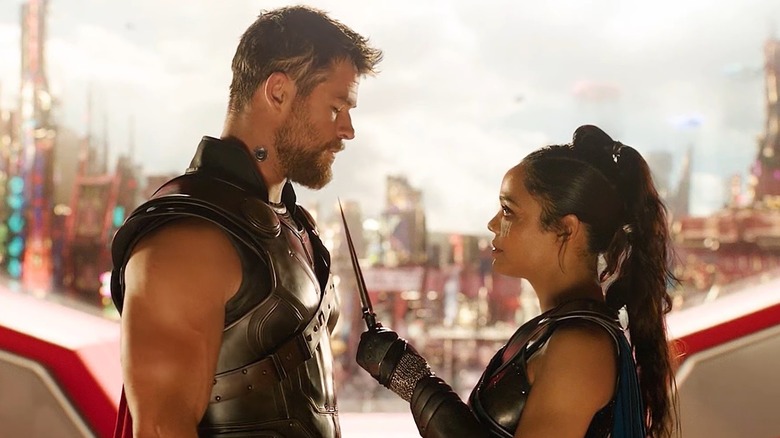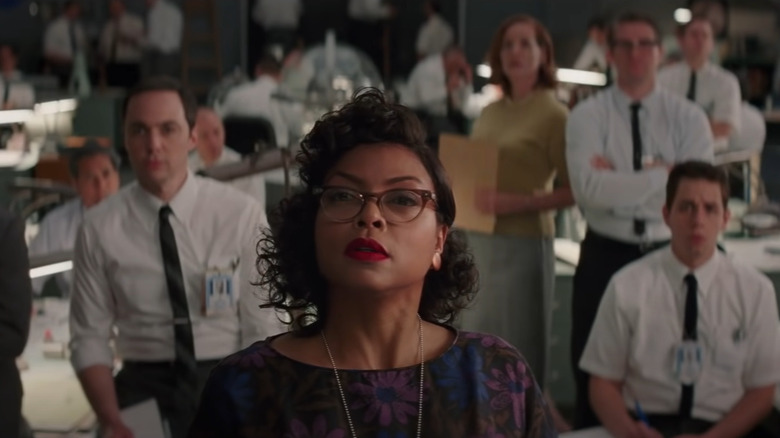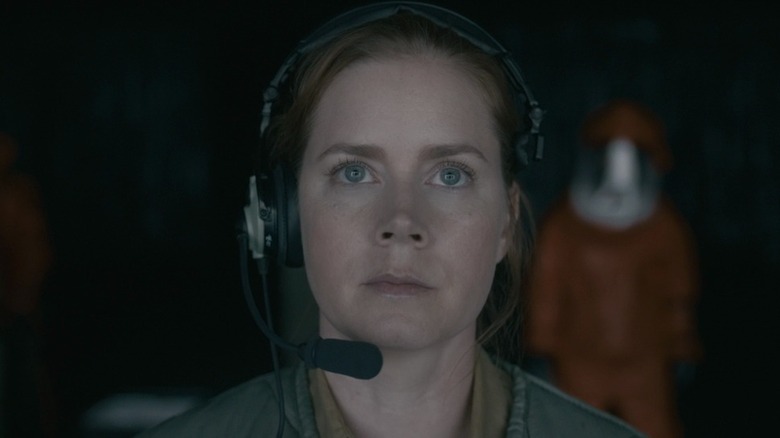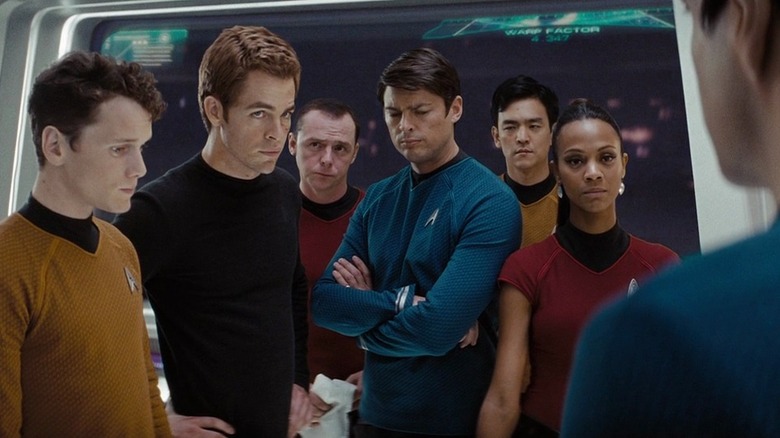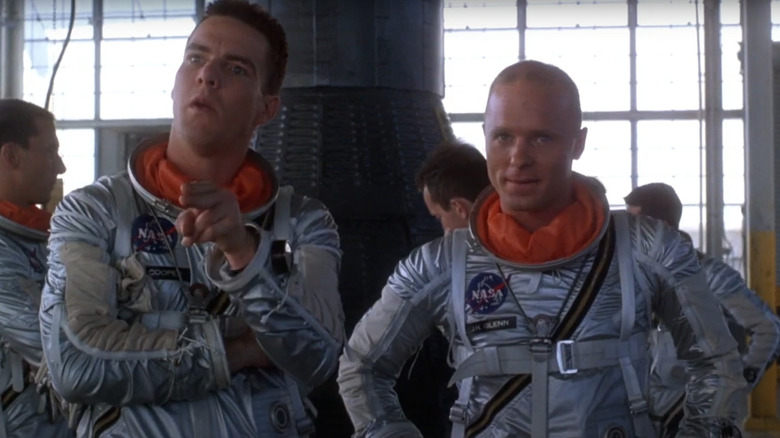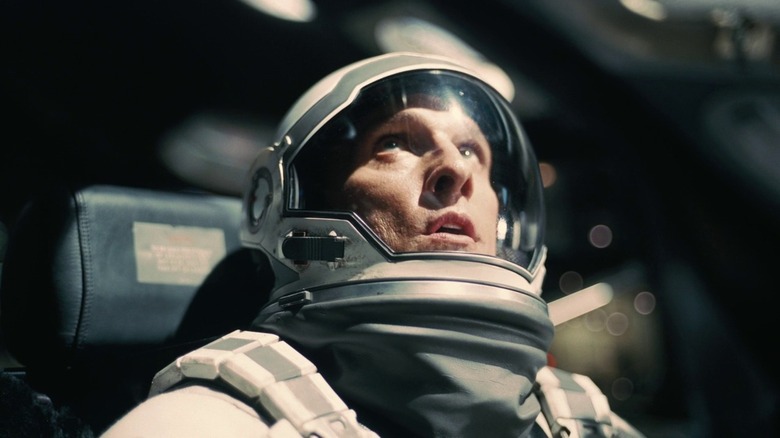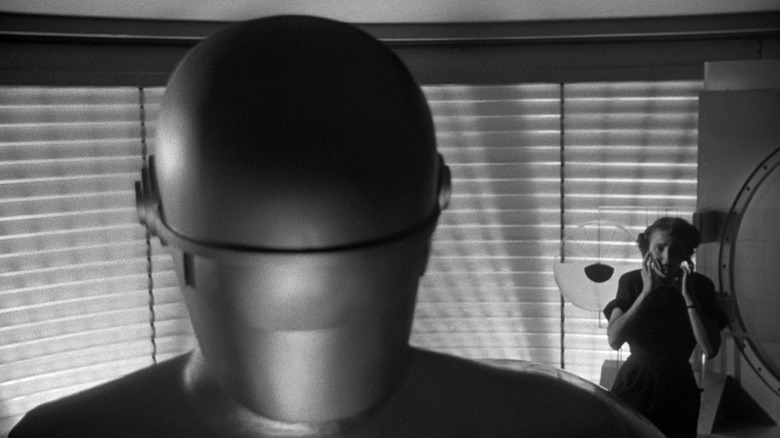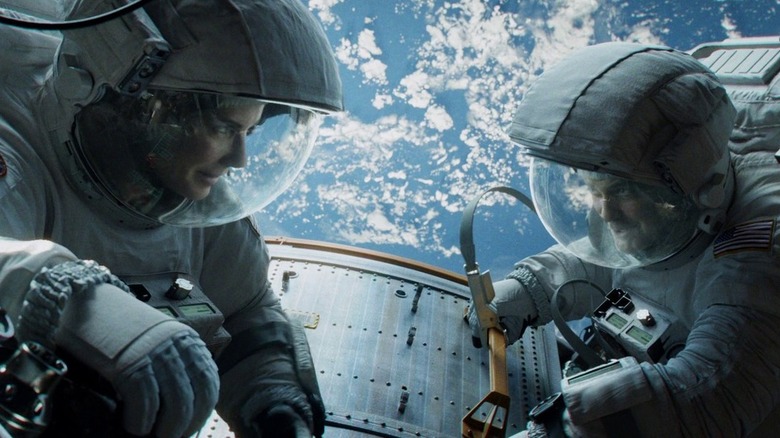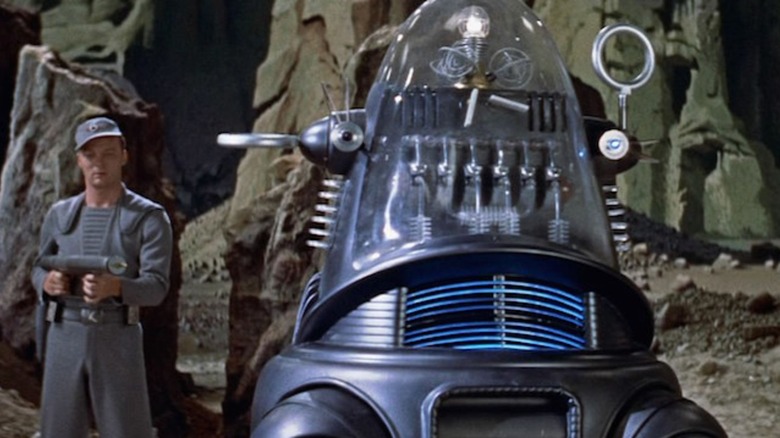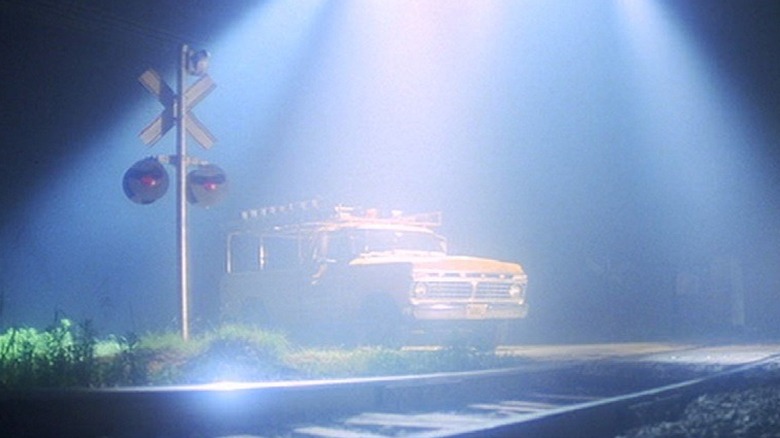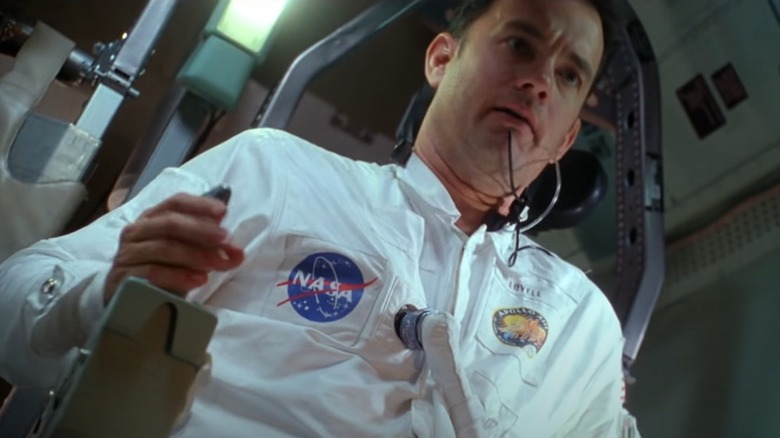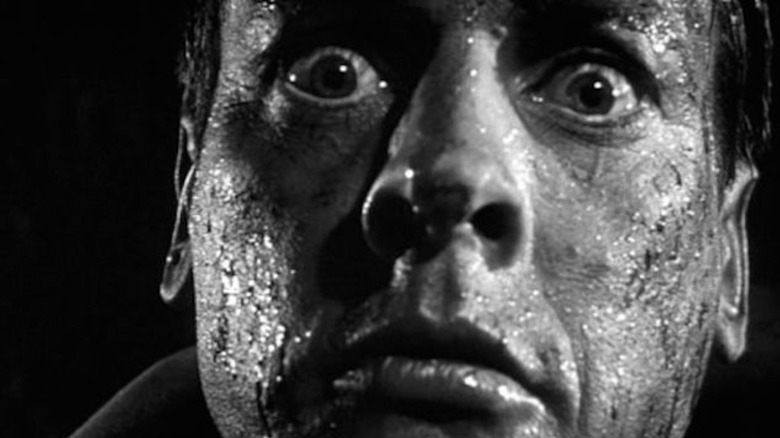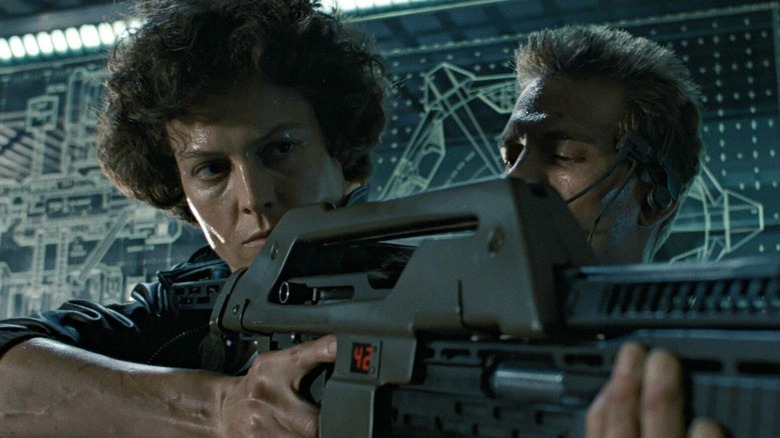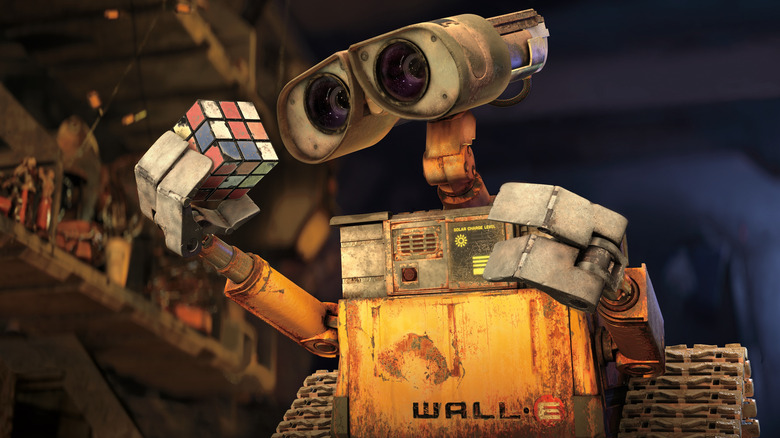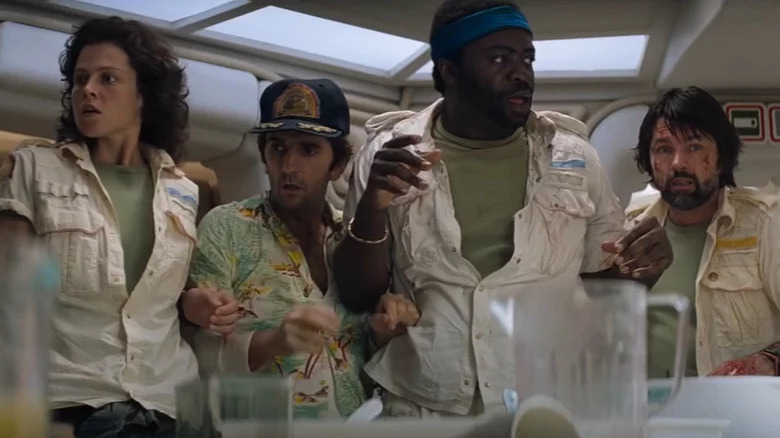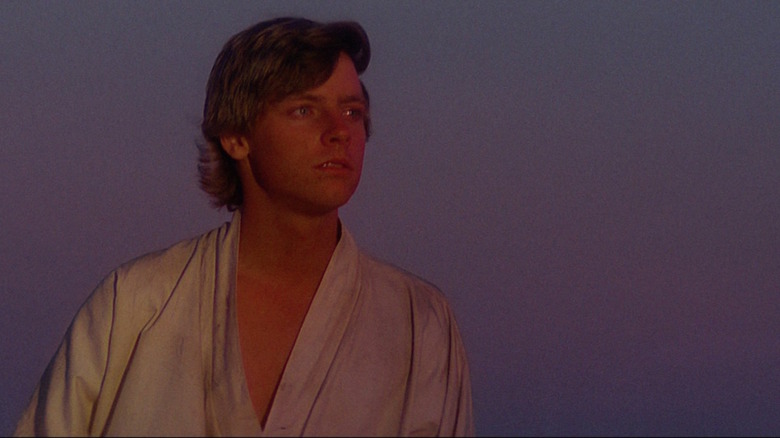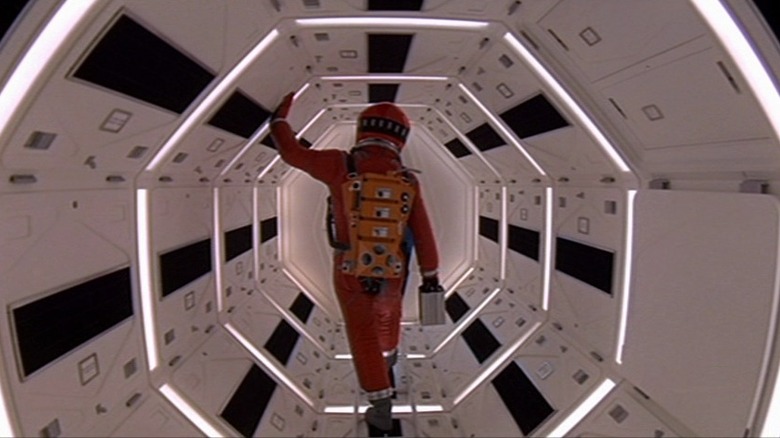50 Best Space Movies Of All Time Ranked
Space is the final frontier, and, of course, the place where no one can hear you scream. As a setting for movies, space has provided endless opportunities for incredible films, ones that showcase humanity's fascination with places unknown, epic journeys, weird and wonderful creatures, and alien technology. Sitting within the realm of science fiction, it's a subgenre that continues to surprise and delight audiences.
As few of us will be able to experience the wonders of space for ourselves, movies are the thing that can transport us there. Some convey the awe and wonder of other worlds and planets, whereas others take a distinctly darker approach, portraying space as something to be feared, full of things that humans should perhaps not meddle with.
From a 1902 silent film about the moon to modern planet-hopping blockbuster behemoths, the genre has something to offer everyone, with possibilities almost as vast as the universe itself. While many of these films focus on people traveling to other planets –- both real and fictional –- or visitors from other worlds coming to Earth, others are much more grounded in reality, taking inspiration from real-life events and space missions. With a whole galaxy of films to choose from, these are the very best space movies. (Warning: There are spoilers below.)
Updated on July 6, 2022: Space stretches on forever, which means there's plenty of room for more space movies. As otherworldly films take their place in the cosmos, we'll be sure to add any instant classics to our list.
50. The Hitchhiker's Guide to the Galaxy
Based on the book of the same name by Douglas Adams, this 2005 film adaptation of "The Hitchhiker's Guide to the Galaxy" certainly retains the offbeat (and very British) humor of the source material and boasts a starry cast that includes Martin Freeman, Zooey Deschanel, Bill Nighy, Sam Rockwell, and Stephen Fry, to name but a few.
The film's hero is Arthur Dent (Freeman), who finds himself whisked away from Earth when an alien construction crew invades. At times, the film feels a little like a fever dream, and those unfamiliar with the tone of Adam's book may find themselves alienated by how madcap it feels. However, if you're a fan of stuff like "Monty Python," this film is a real treat and a palette cleanser to some of the more serious space movie offerings. As Peter Travers in his review for Rolling Stone puts it, "Adams would be pleased."
49. Elysium
Following the incredible "District 9" was no easy feat for director Neill Blomkamp, and while "Elysium" doesn't reach the heights of that film, it's still one that's worth a watch. "Elysium" continues some of the themes set out in Blomkamp's previous movie, particularly examining the idea of class inequality. Set in the year 2154, there are vast wealth divisions in humanity, with the mega-rich living on a luxury space station called Elysium and the rest living hand-to-mouth in what remains of the Earth. The future hangs in the balance as Max Da Costa (Matt Damon) seeks to bring equality between the groups, but Secretary Delacourt (Jodie Foster) stands in his way as she endeavors to protect the prosperous population of Elysium.
While the film performed well at the box office, Blomkamp himself had some regrets about its script, saying, "I just didn't make a good enough film is ultimately what it is" (via Uproxx). However, we think the guy is being a little hard on himself. After all, it was well-received by critics, including Amon Warmann for CineVue, who called it "one of those rare blockbusters that manages to be entertaining while also having something relevant to say."
48. Armageddon
It may have been critically panned, but "Armageddon" taps into exactly what makes space movies so entertaining, focusing on a catastrophic apocalyptic event, with Earth's only hope being a team of underdogs. When an asteroid the size of Texas is on course to destroy the world, NASA recruits a team of oil drillers to drill a hole in the asteroid and plant a bomb inside to break it apart. Heading up this team of unlikely heroes is blue-collar driller Harry Stamper (Bruce Willis), a guy who, rather than train the astronauts in how to drill, insists upon taking his own ragtag team into space to complete the mission.
Despite some scathing critic reviews — including Stephen Hunter for the Washington Post who said, "It leaves no stone unturned in its search for the perfect cliche" — the film pulled in huge numbers at the box office. Making over $553 million worldwide, "Armageddon" was the highest-grossing film of 1998, ahead of big hitters such as "Saving Private Ryan" and Roland Emmerich's "Godzilla." And hey, it was good enough to find a place in the Criterion Collection, so it's good enough for us.
47. Europa Report
Our fascination about whether life exists on other planets is frequently the subject of movies, like this underrated 2013 film. Partially filmed in a found-footage style, "Europa Report" follows a group of astronauts as they embark on a mission to Europa –- one of the moons of Jupiter –- to search for signs of life. Using this filming technique helps to ground the film in a strikingly realistic way, as well as adding to the claustrophobic and tense atmosphere.
Space movies aren't often praised for their sense of realism, but "Europa Report" was an exception to this, with Space.com saying it "just might be the most realistic — and harrowing — depiction of space travel on the big screen in years." Without a major distributor behind it, the film had a limited release and even more limited box office takings, but it boasts an impressive 'fresh' rating on Rotten Tomatoes, with critics such as Michael D. Lemonick for Time calling it "brisk, thrilling and ultimately terrifying."
46. Serenity
Despite only running for one season, Joss Whedon's sci-fi series "Firefly" proved to be a huge cult hit, with a passionate fanbase who are still calling for its return. While Whedon might not have been able to get another season off the ground, he did manage to get the backing for a feature film as a continuation of the story, and in 2005, "Serenity" was released. The film –- which also marked Whedon's feature directorial debut –- saw the cast returning for a new adventure, as the crew of the Serenity spacecraft takes on two fugitives while the ominously named "The Operative" (Chiwetel Ejiofor) pursues them.
Of course, fans of "Firefly" absolutely adored "Serenity," and it proved to be the making of Joss Whedon's directorial career (for better and for worse), as his next feature film was 2012's "The Avengers." As for the film itself, in follows in the "Firefly" mold of making space like the landscape of the Wild West — grungy, dangerous, and untamed. "Serenity" was also favorably received by critics, with Nick Funnell of Time Out saying, "The settings and tone are hyper-real, yet the human behavior is grounded and credible, the moral conflicts complex and involving."
45. Deep Impact
While "Armageddon" –- the other space-themed disaster movie that came out in 1998 -– eventually dwarfed "Deep Impact" in terms of overall box office, "Deep Impact" is arguably the stronger film, and it had a better opening weekend to its counterpart, beating it by just over $5 million. In the movie, an 11km wide comet is on course to collide with Earth with catastrophic consequences. While a heroic team of astronauts is sent out to try and decimate the comet in orbit, the film focuses more heavily on the human impact, as those on Earth face their possible extinction.
Unlike "Armageddon," "Deep Impact" has been lauded for being a much more realistic depiction of what would happen when a comet is on a collision course with Earth. For example, n an interview with BuzzFeed, astrophysicist Neil deGrasse Tyson praised the film, saying that it "had really good science going there."
44. Zathura: A Space Adventure
A decade after the original "Jumanji," another board game-based adventure arrived in the form of "Zathura: A Space Adventure." With a considerable advancement in special effects from its jungle-themed counterpart, "Zathura" tells the story of two brothers who are transported into space by a game that they discover in their basement. As you might expect, the film follows a lot of similar beats to "Jumanji," but it's a thrilling and fun film in its own right, with a surprisingly touching story about two bickering siblings who eventually learn how to play nice.
With competition from Disney's latest animated film "Chicken Little," and "Harry Potter and the Goblet of Fire," "Zathura" had a disappointing turnout at the box office. Despite this, the film was well-received by critics, including Desson Thomson for the Washington Post who said it "salutes the low-tech magic that lurks inside a board game -– that hidden ability to bring people together."
43. Event Horizon
Space frequently provides a terrifying backdrop for films that finely toe the line between sci-fi and horror, and one of the most nightmare-inducing examples is 1997's "Event Horizon." When a spaceship that previously disappeared into a black hole comes back into orbit, a rescue crew is deployed to investigate, unaware that something dark and sinister has found its way on board. "Event Horizon" plays out like a haunted house movie in space, with a certain debt owed to films such as "The Shining" and "Alien" in terms of creating that feeling of paranoia and claustrophobia.
"Event Horizon" was plagued by a troubled production, and upon its release, not only was it a box office flop but it was torn apart by critics like Jonathan Rosenbaum for Chicago Reader, who called it "the pits." However, in a similar trajectory to 1982's "The Thing," it became a cult hit following its release on home video and has subsequently been re-assessed as an underrated example of the genre.
42. Mars Attacks!
With a star-studded cast and Tim Burton at the peak of his powers, "Mars Attacks!" –- the director's loving homage to sci-fi B-movies –- proved to be divisive upon its release. It is, however, a film that's improved over time, and its cutting satirical anti-establishment themes mean it's remained surprisingly relevant.
Based on the trading card series of the same name, "Mars Attacks!" sees hordes of little green men arrive on planet Earth, while the world's assembled powers wait to see if their intentions are peaceful. Whether it is the aliens' hilarious way of speaking or the femme fatale "Martian Girl" (Lisa Marie) with her iconic bouffant blonde wig, "Mars Attacks!" is packed with moments that make it unlike any other alien invasion film you'll see.
While the unique and zany nature of the film didn't necessarily connect with American audiences, it performed much better in Europe, cementing its status as a future cult classic. The mixed reactions of cinemagoers are also reflected in the critical reception, with Empire's Mark Salisbury praising the film, calling it "giddily madcap, surreal, sardonic satire," while Peter Stack for the San Francisco Chronicle said it "blows most of its inspired moments with its mean-spirited mentality." As for us, we definitely agree with Salisbury — "Mars Attacks!' just might be Tim Burton's most underrated movie.
41. Life
The story may be a familiar one –- a crew on board a spaceship finds a rapidly evolving life-form that threatens their existence –- but 2017's "Life" proves that this oft-repeated concept is still one that can draw in an audience. Largely bolstered by a starry cast that includes Jake Gyllenhaal, Rebecca Ferguson, and Ryan Reynolds, "Life" focuses on a small crew on the International Space Station who uncover evidence of life on Mars. What's particularly terrifying about this film is we see the evolution of the life form –- which our heroes name "Calvin" –- as it adapts and changes into something that doesn't just pose a threat to the crew members but to all life on Earth.
While it treads familiar ground and instantly leads to comparisons with the much superior "Alien," "Life" has some well-timed and effective moments of body horror, with a particularly bleak twist ending that will haunt you as the credits roll. As with many of the films of this ilk, the characters aren't particularly well-developed, but the concept itself is scary enough to keep your interest.
40. Independence Day
"Master of Disaster" Roland Emmerich shamelessly borrows from pretty much every other alien invasion film in existence, but there's still something unabashedly entertaining about "Independence Day." With a cast that includes '90s movie stalwarts such as Will Smith, Jeff Goldblum, and Bill Pullman, the film wears its patriotic heart on its sleeve –- the clue is in the title after all –- and for many, it has become the mainstay movie of the holiday, along with classics like "Jaws."
It may have been Steven Spielberg that invented the blockbuster with the aforementioned "Jaws," but Emmerich ushered in a new era, with movies featuring wanton destruction of major landmarks proving to be big business. Spielberg even reportedly said to Emmerich, "This movie will do more to change blockbuster summer movies than any movie before" (via Deadline). The numbers certainly reflect how huge "Independence Day" was, bringing in a whopping $817 million worldwide and becoming the highest-grossing film of 1996.
39. Treasure Planet
Directors Ron Clements and Jon Musker had been floating the idea of "Treasure Island in Space" for almost two decades. While the directing duo enjoyed success in the meantime with films such as "The Little Mermaid" and "Aladdin," their passion project finally came to fruition in 2002, rebranded as "Treasure Planet." While the film was a huge flop for Disney, it's hugely imaginative and marked a big leap forward in terms of blending CGI animation techniques with the more traditional hand-drawn style.
The film focuses on Jim Hawkins (voiced by Joseph Gordon-Levitt), a rebellious teen who's bequeathed a treasure map, and along with a cyborg John Silver (Brian Murray) as his mentor, he embarks on the journey to find the hidden loot. Despite the poor box office takings, "Treasure Planet" received many positive reviews, including from critic Ed Gonzalez for Slant Magazine who said, "The film is alive with a rollicking sense of adventure." It may not match some of Disney's other films in terms of longevity, but based on sheer spectacle, it's one of the very best.
38. Contact
Movies about aliens tend to go one of three ways: over-the-top and explosive spectacle, horror and paranoia, or quiet and contemplative reflections about life on this planet. "Contact" fits into the latter, alongside films such as "Close Encounters of the Third Kind" and "Arrival." The film focuses on scientist Dr. Ellie Arroway (Jodie Foster), who dedicates her life to listening for signs of life from other worlds. When a coded message is received from outer space, Ellie deciphers it and discovers it reveals the schematics for a single-occupant transporter, one that will later take her face to face with the aliens that sent the message.
The thing that stands out about "Contact" is that it isn't the sort of film you might expect it to be. Like 2016's "Arrival," "Contact" examines a character's personal and emotional journey as they seek to communicate with those beyond. Set against the backdrop of space, it probes into life's big unanswered questions and the role that religion and science perhaps play in our understanding of the wider universe. It's an undoubtedly powerful film and a truly underrated example of the genre.
37. Starship Troopers
Set in the 23rd century, "Starship Troopers" sees humanity locked in a brutal battle against giant alien bugs. And as this entertaining cult classic comes from director Paul Verhoeven ("RoboCop," "Total Recall"), you know it's going to be a truly wild ride. As well as some brilliantly brutal battle scenes, "Starship Troopers" satirizes extreme militarism through the bombastic, overly nationalistic propaganda news reports.
As is often the case with satire, "Starship Troopers" wasn't particularly well-received by critics when it was released. However, more recent reappraisals have seen a new appreciation for some of the film's evergreen themes and its biting wit. Writing for The Atlantic, Calum Marsh said, "If you're open and attuned to it ... you'll get the joke 'Starship Troopers' is telling. And you'll laugh." Slant Magazine also chimed in with the praise, labeling Verhoeven's misunderstood gem as "one of the greatest of all anti-imperialist films."
36. The Fifth Element
While they may not be the most practical fashion choices, '90s sci-fi films were almost unbeatable when it came to iconic looks, and just two years before Neo's long black coat made waves in "The Matrix," there was Milla Jovovich as Leeloo in her unforgettable "thermal bandages" in Luc Besson's ambitious 1997 film, "The Fifth Element." Beginning in Egypt in 1914 and rocketing ahead 300 years to a futuristic New York, the film sees Leeloo join forces with an unsuspecting cab driver, Korben Dallas (Bruce Willis), to protect the world from the Great Evil –- a giant sentient burning space sphere –- and the ruthless Zorg (Gary Oldman).
The film proved to be polarizing among critics when it opened the Cannes Film Festival, with Roger Ebert for the Chicago Sun-Times calling it "one of the great goofy movies," while Todd McCarthy for Variety said it was "ultimately a mess of diverse ingredients that sorely could have used a rigorous screening process to eliminate all the chaff." There's a strong argument on both sides for why this film could fall under the "so bad it's good category," but it is certainly one that needs to be experienced.
35. Silent Running
The theme of environmentalism crops up in space movies perhaps more often than you might think, and the idea that the fragility of life and Earth's ecosystem can so easily be disrupted by a catastrophic global event provides the perfect framing for a story. It's something that seems distant yet also completely possible — and certainly more believable than alien invaders. This idea is explored in 1972's "Silent Running," where ecologist and botanist Freeman Lowell (Bruce Dern) tends to what remains of Earth's plant life, now preserved in enormous domes in space.
With a scaled-back cast, the focus of the film is on the character of Lowell and his particularly charming relationship with two robots, Dewey and Louie. It wears its eco themes on its sleeve, yet it never feels condescending or preachy, and the influence of "Silent Running" is particularly clear in Pixar's "WALL-E," which came more than 35 years later. It isn't as flashy as a lot of other space films, and it lacks the technical prowess of films such as "2001: A Space Odyssey," but there's an undeniable charm to "Silent Running" and a potency to its themes that seems to become more and more relevant over time.
34. Prometheus
The sequels to 1979 classic "Alien" have varied in terms of quality, but one that was favorably received was 2012's "Prometheus." Serving as an origin story of sorts, the film sees a crew embark on a journey to the dark reaches of the universe, hoping to uncover the origins of humanity itself but instead discovering something terrifying. Seeking to answer some of the questions from "Alien" while still retaining enough suspense to keep things interesting, "Prometheus" works as both a highly effective prequel and an entertaining sci-fi horror film that's capable of standing on its own merit.
While it slots neatly into the timeline of the other films in the franchise, "Prometheus" has its own mythology, and it draws its thematic exploration of humanity's relationship with its creators from the Greek Titan that gives the film its name. Utilizing the body horror and well-executed scares that made the original film so iconic, "Prometheus" is a more than worthy inclusion in the franchise.
33. War of the Worlds
It may be a story that's been told over and over again, but Steven Spielberg's adaptation of the H.G. Wells classic retains the sense of paranoia and uncertainty from the source material while also delivering a fresh take in terms of action movie thrills and sheer drama. The destructive capabilities of the imposing alien structures are seen through the eyes of everyman Ray Ferrier (Tom Cruise), who desperately tries to save his family from the threat.
Spielberg's previous dalliances with aliens in his films saw them depicted as passive and communicative in "Close Encounters of the Third Kind" and even downright lovable in "E.T. the Extra-Terrestrial." It's particularly thrilling therefore to see him focus on a more powerful and violent alien race, while never losing the emotional resonance that made the aforementioned films so memorable. Speaking about his approach to the film, Spielberg said, "I wanted this to be a very personal story about a family fleeing for its life. And a father trying to protect his two kids" (via USA Today). With heart and undeniable spectacle, "War of the Worlds" proves once again that no one does it better than the man who invented the blockbuster.
32. Sunshine
The rug-pull of Danny Boyle's "Sunshine" from a relatively straightforward sci-fi epic to a slasher film in space is the thing that elevates it above other similar offerings, and it remains one of the best examples of genre-bending in cinema. The film is set in the year 2057, where the Earth is freezing due to the sun dying, and a group of astronauts is tasked with re-igniting the star and saving the world. While the "mission to save humanity" aspect of "Sunshine" is familiar, the turn that the film takes is what sets it apart.
This duality to the film was also something that turned some critics off, as they found the tonal shift jarring. San Francisco Chronicle critic Mick Lasalle was particularly scathing, opening his review by saying, "After watching it for 20 minutes, you really don't care if the sun is cooling and all human life is doomed to destruction. Actually, it sounds like a great idea –- anything to end the movie." While the film may have been a difficult sell at the time –- something reflected in the box office takings –- the audacity of Boyle to make a film that sits closer to "2001: A Space Odyssey" than it does "Armageddon" has to be commended.
31. Super 8
This 2011 thriller from director J.J. Abrams lovingly pays tribute to nostalgic classics such as "E.T. the Extra-Terrestrial" and "Stand by Me," while also being a celebration of the art of moviemaking in itself. In the film, a group of friends are shooting their own zombie movie when they witness a horrific train crash and an alien creature emerging from the chaos. While the action in "Super 8" may take place on Earth, the focus is on the alien invaders and particularly how this is seen through young eyes.
With excellent performances from Elle Fanning and Joel Courtney in particular, "Super 8" evokes the feeling of some of Steven Spielberg's early work, (the director has a producer credit for this film) giving equal importance to blockbuster spectacle and genuine heart and warmth. The film proved to be a surprise commercial success, making over $260 million at the box office, and was praised by critics, including Total Film critic Jamie Graham who remarked, "Only a young Spielberg at the top of his game could beat it."
30. Apollo 10½: A Space Age Childhood
Few directors capture a moment in time as well as Richard Linklater, and in this charming animated film, he turns his attention to 1969's moon landing. Like most people of the time, Stanley (Milo Coy and Jack Black) is caught up in Apollo fever, and fantasizes about being trained by NASA for a secret lunar visit. Memories of his Houston childhood intertwine with his fanciful dreams of becoming a pint-sized astronaut, tied together by Jack Black's warm narration.
Stan's space adventures might be pure fantasy, but "Apollo 10½: A Space Age Childhood" taps into the very real wonder of space and this moment in time, which brought so many cultural and scientific possibilities to light. What results is a deeply personal, totally relatable, and wholly different space movie which speaks to universal fascination with worlds beyond our own and all that humanity might achieve.
29. Total Recall
From Paul Verhoeven, the director of "RoboCop" and "Starship Troopers," "Total Recall" is another brain-busting, brutal sci-fi epic. Arnold Schwarzenegger plays a construction worker Douglas Quaid, who decides to have a virtual vacation to Mars by visiting the company "Rekall" -– a corporation that plants false memories into people. However, all does not go to plan, and Quaid discovers life as he knows it is false, and the people who put his memories there want him dead.
The film explores the themes of memory and identity and –- as all of the best sci-fi films tend to do –- leaves the audience with more questions than answers. The movie's ambiguous ending leaves us wondering if what we've seen is real or not, and this is just one of the many things that give the film its staying power. In the '80s and '90s, Schwarzenegger was one of the most bankable box office stars, and this was reflected in the numbers for "Total Recall," making an impressive $261 million worldwide.
28. Planet of the Apes (1968)
Not to be confused with the much-maligned remake, the 1968 version of "Planet of the Apes" stars Charlton Heston and sees a team of astronauts crash-landing on what appears to be a desolate planet. However, they soon discover a society of highly intelligent apes ... who've assumed dominance over the humans that also live there. With people at the mercy of their new ape overlords, the film offers a chilling vision of a future as the humans' fight to survive and escape. And without saying too much for those who've avoided spoilers, the film's now-iconic ending is one of the best movie moments of all time.
Critically acclaimed when it was released, "Planet of the Apes" was also nominated for two Oscars for Costume Design and Best Original Score, and it won an honorary award for John Chambers for Outstanding Make-up Achievement. The legacy and impact of the film were also recognized in 2001 when it was one of the 25 films inducted into the National Film Registry by the Library of Congress.
27. Star Trek II: The Wrath of Khan
Widely considered by many as the best "Star Trek" movie, 1982's "The Wrath of Khan" is also one of the rare movie sequels that manages to surpass the original. Retaining the spirit –- and the cast –- of the '60s TV show, "The Wrath of Khan" sees the return of an old nemesis who's escaped from exile to get revenge on Kirk (William Shatner). Previously appearing in "Space Seed" -– the 22nd episode of the first season of the original series –- Ricardo Montalbán reprises his role as the legendary villain Khan Noonien Singh.
"The Wrath of Khan" saw a huge departure from 1979's slow-moving "Star Trek: The Motion Picture," which had not been well-received, and marked the beginning of a quasi-trilogy that concluded with 1986's "Star Trek IV: The Voyage Home." The decision to make "The Wrath of Khan" more in tune with what made the original series so popular undoubtedly worked, and the film opened to a positive critical response and an impressive box office, earning $95 million worldwide. In a retrospective review for Empire, critic Angie Errigo credited "The Wrath of Khan" with being the film "that put the franchise on the right track."
26. First Man
Following up the multi-award-winning "La La Land" was no easy feat for Damien Chazelle, who became the youngest person to pick up the Best Director Oscar in the process. Before "First Man" in 2018, all of his films had also had a connection to music, but his biopic of astronaut Neil Armstrong saw him blasting off in a completely different direction. Chazelle's camera expertly captures the awe and quiet majesty of space, as well as the frightening, shaky, deafening realism of being an astronaut, putting us right in the throes of Armstrong and his colleagues. At the same time, it also zeroes in on Armstrong's very personal story, outside of the achievements everyone recognizes him for.
Neil Armstrong -– beautifully portrayed by Ryan Gosling –- is grief-stricken following the loss of his daughter, and this is something he carries with him to those memorable first steps. The film may not have enjoyed the same success that "La La Land" did, but critics raved about it, including Owen Gleiberman for Variety, who called it "revelatory in its realism, so gritty in its physicality, that it becomes a drama of hellbent danger and obsession."
25. Dune (2021)
Before adapting Frank Herbert's seminal sci-fi novel, director Denis Villeneuve had proven his credentials in the genre with "Arrival" and "Blade Runner 2049," making him more than qualified to tackle the gargantuan story –- previously adapted for the big screen by David Lynch in 1984. While 2021's "Dune" only tells half of the story -– the sequel is poised for release in 2023 –- it does a remarkable job of establishing the unique desert world of Arrakis and the importance of the central hero, Paul Atreides (Timothée Chalamet).
Paul is the heir to the noble House of Atreides, who's thrown into an interplanetary war centered around Arrakis –- the only place where the precious resource known as "spice" can be found. The scope of "Dune" is undoubtedly huge, and while the world-building is a little dizzying at times, the visual spectacle more than makes up for the dense plot. "Dune" proved to be a big box office success, making just shy of $400 million off a budget of $165 million, all while during the COVID-19 pandemic and as the film was simultaneously released on HBO Max. In other words, it's incredibly impressive that it only narrowly missing out on being in the top 10 highest-grossing films of 2021.
24. Ad Astra
Directed by James Gray, 2019's "Ad Astra" sees astronaut Roy McBride (Brad Pitt) embarking on a personal mission across the universe to investigate the source of mysterious power surges that are seemingly linked to the "Lima Project" –- started by his father almost 30 years previously to find intelligent life. While the title, which translates as "to the stars" in Latin, might suggest that the film is about an epic journey through space, it's instead about a much more internal and human journey, focusing on a man reconciling with his absent dad.
The tone of the film perhaps might've surprised some people, and while it hit the right notes critically, the moviegoing public wasn't so taken with it, resulting in a big discrepancy between the critic and audience scores on Rotten Tomatoes. However, Peter Travers for Rolling Stone spoke particularly favorably about "Ad Astra," saying it has "a grand scope and intimate sense of empathy that is nothing less than enthralling."
23. Moon
Son of the "Starman" David Bowie himself, Duncan Jones made an instant impression on the film world with his impressive debut movie, "Moon," in 2009. Sam Rockwell stars as Sam Bell, a solitary astronaut working on the moon, with Kevin Spacey as the voice of his robot companion GERTY. Along with the astonishing practical effects and a haunting score from Clint Mansell, "Moon" is notable for effectively conveying the loneliness of space. Its focus on the "one man and his robot story" evokes the feeling of films such as "Silent Running," and the calming tones of GERTY call to mind the infamous HAL 9000 from "2001: A Space Odyssey."
While inspired by these space movie greats, "Moon" succeeds in its own way, anchored by a superb performance by Sam Rockwell, whom Jones wrote the part for. With a modest budget of just $5 million, it also proved that a highly effective and emotionally driven space film could be created without the need for a large ensemble cast or expensive special effects, and critic Roger Ebert called it "a superior example of that threatened genre, hard science-fiction."
22. A Trip to the Moon
The oldest film on the list by quite some way, 1902 French silent film, "Le Voyage dans la Lune" ("A Trip to the Moon") is considered by many to be the earliest science fiction film, and it remains one of the most singularly influential pieces of filmmaking to date.
In part inspired by the writings of Jules Verne, Georges Méliès' 13-minute film sees a group of astronomers who launch themselves at the moon. The anthropomorphization of the moon and the iconic shot of the astronomer's capsule hitting him directly in the eye is perhaps the image most people associate with this film. It also appears to have provided direct inspiration for the character of "the Moon" in surreal British comedy series "The Mighty Boosh," as well as appearing in Martin Scorsese's "Hugo."
The narrative may be simple, but the film's groundbreaking special effect techniques and its commitment to pure out-of-this-world fantasy are what we have to thank for the array of science fiction films we have today. In the book "1001 Movies You Must See Before You Die," Chiara Ferrari says that the film "deserves a legitimate place among the milestones in world cinema history."
21. Galaxy Quest
While many space films bear a resemblance to their counterparts, "Galaxy Quest" wears its identity of a loving and hilarious pastiche of "Star Trek" proudly. In this meta sci-fi comedy, the cast of the canceled fictional TV show "Galaxy Quest" find themselves in a real intergalactic adventure when some visiting aliens believe their show is a documentary. "Galaxy Quest" is so closely aligned with "Star Trek" that in 2013, Trekkies voted it as one of the best "Star Trek movies, with IGN commenting, "While not technically a 'Star Trek' movie, one can certainly see how it could make the cut. It's more 'Star Trek' than a couple of the actual 'Star Trek' movies even."
With references to other movies such as "The Day The Earth Stood Still" and "Event Horizon," the film became a cult classic amongst sci-fi fans, making around $90 million at the box office. "Galaxy Quest" also received favorable reviews from critics including Joe Leydon for Variety, who said the film "remains light and bright as it races along, and never turns nasty or mean-spirited as it satirizes the cliches and cults of 'Star Trek.'"
20. The Martian
Stranded on the red planet, alone and with dwindling resources, botanist Mark Watney (Matt Damon) is forced to use all of his skills to survive while those back on Earth try to figure out a way they can bring him home. Grounded by a superb performance by Matt Damon, "The Martian" showcases the unshakable strength of the human spirit as we see Watney –- through a series of video diaries –- work out how to grow food, travel, and communicate with the limited things available to him on Mars.
What's perhaps surprising about "The Martian" is how funny it is. Experiencing the film largely through these diary entries allows the audience into the headspace of Watney, a character whose dry sense of humor makes him distinctly likable and engaging, with much of the film's focus on his solo survival mission. As well as being a hit with critics and audiences, "The Martian" also achieved recognition at the 88th Academy Awards, picking up seven nominations.
19. Guardians of the Galaxy
Compared to the big-hitters of the Hulk and Captain America, this obscure gang of space misfits wasn't as well-known in the Marvel Universe, and yet their debut big-screen adventure proved to be a huge hit. The motley crew that makes up the "Guardians of the Galaxy" consists of a half-human smuggler, a raccoon-like bounty hunter, and a living humanoid tree amongst others, but there was something about the strange dynamics and the retro space-opera adventure style of the film that just seemed to click.
One of the highlights of "Guardians of the Galaxy" was the killer soundtrack –- almost a character in its own right within the film and the perfect accompaniment to its offbeat tone. With its unique blend of zany humor and fun action set pieces, the Guardians easily slotted into the MCU, providing a refreshing palate cleanser for some of the more serious superheroes. As is to be expected with most Marvel films, "Guardians of the Galaxy" was a huge box office success, making more than $773 million worldwide and spawning a number of sequels and appearances for the characters in the wider MCU.
18. Solaris (1972)
Far superior to the 2002 Hollywood remake directed by Steven Soderbergh, the 1972 version of "Solaris" directed by Andrei Tarkovsky remains a benchmark of the sci-fi genre and one of the best space movies of all time. The film focuses on Kris Kelvin (Donatas Banionis), a psychologist who's tasked with exploring a space station above the planet Solaris and assessing the remaining crew members who've started to display erratic behavior.
While "Solaris" is frequently compared with "2001: A Space Odyssey –- with the two films being just four years apart –- there are vast differences between them, with "Solaris" favoring a more emotional and human approach. The film expertly tackles themes such as grief, loss, memory, and the nature of what it means to exist. This thematic existentialism, set against the backdrop of space, is somehow even more potent, and Tarkovsky masterfully directs his film with the time set aside to contemplate its weighty themes. The pace is slow, and while this may prove frustrating for some, if you have the patience for "Solaris," it's an incredibly rewarding experience.
17. Thor: Ragnarok
While you could make the case for any of Thor's big-screen adventures being included in this list, the spaciest of them all is undoubtedly "Thor: Ragnarok." With director Taika Waititi at the helm, "Thor: Ragnarok" seems to take its cues from "Guardians of the Galaxy" and successfully conveys the goofiness of the character. In a severe turn from the almost Shakespearean seriousness of the previous two "Thor" films, Waititi instead leans into the weirdness, and the result is a highly entertaining superhero flick.
Most of the film takes place on the planet Sakaar, where Thor (Chris Hemsworth) crash-lands after the arrival of his malevolent sister, Hela (Cate Blanchett), who quickly assumes power over Asgard. Described as a "garbage planet," Sakaar is ruled by the eccentric Grandmaster (the incomparable Jeff Goldblum), who forces Thor to compete in his Contest of Champions to earn his freedom. The change of direction from Waititi proved to be a hit with critics, including Sheri Linden for The Hollywood Reporter, who called it "engaging enough to hold the attention of even those uninitiated in the lore of the Nine Realms."
16. Hidden Figures
While almost none of this film takes place in space, it does however focus on the lesser-seen –- but equally important -– people working behind the scenes at NASA, who are just as deserving of the spotlight as the astronauts. The unlikely heroes at the center of "Hidden Figures" are three Black women working for NASA as mathematicians, and it's based on the book of the same name by Margot Lee Shetterly. Starring Taraji P. Henson, Octavia Spencer, and Janelle Monáe, the film is set in the 1960s, during the Space Race, and focuses on the women's struggles and challenges in dealing with racial and gender segregation, with every day a fight to prove themselves worthy.
"Hidden Figures" is a truly inspirational story, and while the film takes some artistic liberties with the true story, it remains a powerful tribute to these trailblazing women. The film proved to be a massive commercial success, making just under $236 million at the box office, and it was recognized at the 89th Academy Awards, with nominations for Best Picture, Best Supporting Actress (for Octavia Spencer), and Best Adapted Screenplay.
15. Arrival
With a second entry for director Denis Villeneuve, 2016's "Arrival" is a film that focuses on Earth, yet it deals with the concept of an alien invasion in a way that feels so fresh and innovative that it is absolutely worthy of a place on this list. Based on "Story of Your Life" by Ted Chiang, the film sees 12 imposing extraterrestrial structures arrive at key locations across the globe. While the towering spacecraft look threatening, there's no immediate sign of attack from whatever is on board, so linguistics expert Louise Banks (Amy Adams) is one of the people enlisted to make contact with the creatures and establish their intent.
The film is also peppered with scenes of Louise and her daughter, who tragically dies from a terminal disease. However, as the narrative progresses, it becomes evident that the events we're witnessing aren't perhaps as linear as we had been lead to believe, with the cryptic opening line "I used to think this was the beginning of your story" suggesting that time is a fluid concept within the film. "Arrival" is a very different kind of alien invasion story, with a reflective, meditative, and existential tone in place of explosions and heavy action scenes. While Amy Adams' quietly devastating performance was unfortunately overlooked by the Academy, "Arrival" did pick up eight Oscar nominations and one win for Best Achievement in Sound Editing.
14. Star Trek (2009)
Under the watchful eye of director J.J. Abrams, 2009 saw the reboot of the "Star Trek" series with this new film version. Later going on to direct two of the movies in the "Star Wars" sequel trilogy, Abrams is one of the few to have dipped a toe in both of these major sci-fi universes, although he admits he was not a "Trekkie" growing up. Speaking to The Guardian, Abrams said, "['Star Trek'] always felt like a silly, campy thing. I remember appreciating it, but feeling like I didn't get it."
What Abrams does manage with his version of "Star Trek" is to offer an entry point for complete newcomers, resetting the timeline so that the existing, complex continuity doesn't need to come into play, all while staying true to the original series and movies –- even going as far to feature legendary cast member Leonard Nimoy as Spock Prime. As Abrams himself put it in the aforementioned interview, "I was trying to make a movie, not trying to make a 'Trek' movie." In doing so, he created arguably the best "Star Trek" movie, something that was formally acknowledged at the 82nd Academy Awards where it won the Oscar for Best Achievement in Makeup –- and in doing so, becoming the first "Star Trek" movie to win a golden statue.
13. The Right Stuff
While it may take dramatic deviations from the true story that inspired it, "The Right Stuff" tells the stirring tale of the Mercury Seven, the military pilots who trained as astronauts for the first human spaceflight. These seven men had a rough and ready approach, and their daring attitudes and significance in the early stages of the Space Race led to them being treated almost like rock stars. The film also doesn't shy away from the emotional and mental toll they experienced from being willing to risk their lives and the pressures that came from being thrust into the spotlight during an event in history that was as much about politics as it was technical innovation.
It seems surprising given the subject matter, but the film was a box office flop when it came out, making just over $21 million off a budget of around $27 million. It proved to be a hit with the critics, however, with Roger Ebert giving it a perfect four-star rating and naming it as one of the very best films of the 1980s. The movie also received eight nominations at the 56th Academy Awards, winning for Best Film Editing, Best Original Score, Best Sound, and Best Sound Effects Editing.
12. Interstellar
If there's one director who can be relied upon to create a mind-blowing space epic, it's Christopher Nolan. "Interstellar" is set in a dystopian future where the crops are failing and drastic changes in the weather pose a real threat to the planet's survival. When Cooper (Matthew McConaughey) discovers some strange patterns –- which he deduces are coordinates -– in the dust in his daughter's bedroom, his life-altering journey begins. Following the coordinates, he finds Professor John Brand (Michael Caine), who heads up a secret facility trying to investigate wormholes in space that may provide the hope humanity needs to survive.
With a small crew, Cooper pilots the spacecraft Endurance to discover if a habitable planet exists beyond their own. Of course, this being a Christopher Nolan movie, there's a lot more going on besides this seemingly straightforward journey, and the film takes us to unknown dimensions and has us questioning the very nature of reality and time. Beyond the spectacle, "Interstellar" is also a highly emotional journey, with the oft-memed clip of Cooper breaking down in tears being one of the most devastating scenes in a sci-fi film. Accompanied by the unforgettable score by Hans Zimmer, "Interstellar" is a film like no other and one that's incredibly rich in thematic content.
11. The Day the Earth Stood Still (1951)
Alien invasion movies frequently depict the arriving creatures as menacing and a threat to humanity's existence. While there is a place for this sort of film –- and they are undeniably fun to watch –- there's also something to be said for films that take a much more peaceful approach, such as 1951's "The Day the Earth Stood Still." When humanoid extraterrestrial Klaatu (Michael Rennie) and robot Gort (Lock Martin) arrive on Earth, it's not with their weapons directed at the humans, but instead, they come with a cautionary message about the dangers of war and the threat humanity poses to itself if people don't heed their warning.
Set against the backdrop of the Cold War, "The Day the Earth Stood Still" speaks to the suspicion and distrust that existed between people at the time, while also providing a message that's surprisingly relevant to society today. The film's emphasis on receptiveness and the importance of speaking and listening to those who are perhaps different to us is also seen in films such as "Arrival" and "Close Encounters of the Third Kind," and despite its dated special effects, "The Day the Earth Stood Still" remains one of the greatest alien films of all time.
10. Gravity
Anchored by a powerful and committed performance from Sandra Bullock, "Gravity" is effectively a survival drama, expertly conveying the feelings of isolation and loneliness that are even more potent given the space setting. Bullock plays Dr. Ryan Stone, who -– in an astonishingly dramatic sequence -– is left adrift in space when some debris hits her shuttle during a routine spacewalk. At times, we see things directly from Dr. Stone's point of view, something that is highly effective, as well as occasionally nauseating and claustrophobic. Director Alfonso Cuarón crafts a singularly personal story, himself describing it as "a drama of a woman in space" (via BBC) more than a sci-fi film in the truest sense.
"Gravity" proved to be a huge box office success, earning more than $723 million worldwide, and it became one of the highest-grossing sci-fi films outside of a major franchise. At the 86th Academy Awards, "Gravity" had a staggering 10 nominations and won seven, including the coveted Best Director for Cuarón. "Gravity" remains one of the most visually stunning space movies, with its focus on a sole surviving character giving the film the emotional resonance it needs to stay with you for a long time afterward.
9. Forbidden Planet
There's something incredibly tactile about early science fiction, with the limited special effects, besuited actors in the place of robots and aliens, and elaborate and imaginative set designs. 1956's "Forbidden Planet" is one such film, a ground-breaking sci-fi masterpiece that's frequently cited as one of the most influential of the genre. The film has several "firsts" credited to it, including being the first film to be set entirely on a different planet and the first Hollywood film to have an all-electronic score (via FilmSite).
Loosely based on Shakespeare's "The Tempest," "Forbidden Planet" is set in the 23rd century, and the film depicts a team of astronauts sent to explore the planet Altair IV, where a colony was established 20 years prior. They discover only two humans remaining — a scientist and his beautiful daughter – plus Robby the Robot, a figure so significant in the film he's even credited as his character name. Robby marked a huge leap forward both in terms of the extortionate cost to build the prop and the distinct personality he was given. Reportedly costing around $125,000 to build, Robby ended up being a necessary cost as he became "the film's most memorable character and responsible for the cult status the movie enjoys" (via Robot Hall of Fame). "Forbidden Planet" may look dated now compared to the slick space movies we are accustomed to, but it's campy fun and a must-watch for any fan of the genre.
8. Close Encounters of the Third Kind
Fresh off the back of their grueling shoot together on "Jaws," Steven Spielberg and Richard Dreyfuss teamed up once again for "Close Encounters of the Third Kind." Spielberg's fascination with worlds beyond our own was something that started from a young age and shaped many of his films, including "E.T. the Extra-Terrestrial," "War of the Worlds," and of course, this 1977 sci-fi masterpiece. In a 2005 interview, Spielberg said, "I first became aware of the sky when my father pointed out the Perseid meteor shower to me when I was about 6 years old. ... My father really held the key to the universe, which unlocked my imagination" (via The Spokesman-Review).
Richard Dreyfuss plays Roy Neary, an everyman whose encounter with a UFO leads to an obsession that sees him willing to risk it all to pursue what he saw and make contact. Even at this early point, the music of composer John Williams was already becoming synonymous with Spielberg's films, with "Close Encounters of the Third Kind" marking the third collaboration between them. Not only is Williams' score as wonderful as you'd expect, but it plays an important part in the narrative itself during the memorable sequence when the aliens communicate with the humans through light and sound. Perhaps influenced by Spielberg's childhood fascination with the cosmos, "Close Encounters of the Third Kind" refreshingly depicts the aliens as peaceful and benevolent, resulting in a film that's as optimistic as it is awe-inspiring. Spielberg has rarely been better than this.
7. Apollo 13
As this list proves, there's a huge amount of choice when it comes to films about humanity's desire for space exploration, with a number of them being based on true stories. Arguably the most well-known movie that falls into this category is "Apollo 13," based on the troubled mission of the same name in 1970. Directed by Ron Howard, the film stars Tom Hanks, Bill Paxton, and Kevin Bacon as the team of astronauts whose lives are at risk when their spacecraft is damaged, forcing them to shift their focus to making it safely home rather than their original lunar destination.
While the film made some minor changes to the story, director Ron Howard was also determined to make the film as technically accurate as possible, including making an exact replica of the Mission Control room where the ground staff communicated with the astronauts. While this is a nitpick few people would ever realize, they did slightly alter the famous "Houston, we have a problem" line, with NASA records stating that what was actually said was, "Houston, we've had a problem." Semantics aside, "Apollo 13" proved to be a huge hit with critics and audiences, with the Rotten Tomatoes consensus saying, "Apollo 13 pulls no punches: It's a masterfully told drama from director Ron Howard, bolstered by an ensemble of solid performances."
6. Invasion of the Body Snatchers (1956)
There is considerable merit to the 1978 remake, but it's the original 1956 "Invasion of the Body Snatchers" that stands as one of the greatest space movies of all time, and it achieves this by never leaving the planet and hardly showing the invading alien forces at all (well, at least in their "true" form anyway). In the fictional town of Santa Mira, Dr. Miles Bennell (Kevin McCarthy) is alerted to reports from people convinced that their relatives are imposters. As the number of reports grows, Dr. Bennell and his old flame, Becky (Dana Wynter), discover some mysterious seed pods, with each one holding the terrifying ability to produce an identical copy of the human they "invade."
While other films on this list involve traveling to different planets in search of alien life, "Invasion of the Body Snatchers" not only brings the discovery to Earth but adds a terrifying dimension with the concept that the "aliens" look exactly like humans. The film offers some timely commentary on the post-war paranoia that existed in America at the time, particularly the fear surrounding covert espionage from people planted with deliberate intentions of blending in while acting as enemy spies. The 1978 remake leans much further into body horror, but the 1956 version still blurs this line, expertly conveying a sense of dread and quiet horror. In the closing moments, Dr. Bennell runs hysterically along the highway before looking straight into the camera with an ominous warning, in one of the most chilling and effective movie moments of all time.
5. Aliens
A sequel rarely manages to match its predecessor, but many consider 1986's "Aliens" to be the best example of this. And indeed, there's only 1% that separates their Tomatometer ratings on Rotten Tomatoes. Where "Alien" could be classed as science fiction horror, "Aliens" sits much closer to a science fiction action flick, with returning hero Ripley (Sigourney Weaver) joining forces with colonial marines on a mission to destroy the aliens who took the lives of the Nostromo crew. Along the way, Ripley encounters an abandoned young girl nicknamed Newt, (Carrie Henn), who she becomes fiercely protective of –- even stepping in to defend her against the ferocious alien queen, which is a scene that gives the film one of its most memorable quotes.
As well as the shift of genres from horror to action, "Aliens" saw a change in director as well, with James Cameron brought on board following his success with "The Terminator" in 1984. Like Cameron's other wildly successful films at the time, "Aliens" took the box office by storm, earning just over $131 million –- around $25 million more than "Alien" made. The success of "Aliens" even extended to the Oscars, where it was nominated for seven awards, including a Best Actress nomination for Sigourney Weaver when films of this genre were rarely recognized by the Academy. While she didn't win, it did pick up prizes for Sound Effects Editing and Visual Effects.
4. WALL-E
Released in 2008, Pixar's animated adventure about possibly the universe's most adorable robot has proved to be one of the studio's most enduring features. Set in the year 2085, the Earth has been abandoned, and all humans now reside on giant luxury starliners where their every need is catered for and they never need to lift a finger. In contrast, back on Earth, a small trash-compacting robot called WALL-E is tasked with the mammoth job of cleaning up the mess humans left behind after decades of consumerism depleted all natural resources. When another robot named EVE arrives, WALL-E becomes quite enamored with her and shows her a tiny green sapling he found -– something that provides the tiniest shred of hope that life may still be able to exist on Earth.
With the first part of the film largely silent, "WALL-E" relies on our wonderfully expressive robot duo to establish this world. According to the film's director Andrew Stanton, the team achieved this by watching "a [Charlie] Chaplin film and a [Buster] Keaton film and sometimes a Harold Lloyd film every day at lunch" (via The A.V. Club) as inspiration for how to tell their story visually. "WALL-E" succeeds in taking an idea that's familiar in the space movie genre and making it palatable enough for children while also engaging enough for adults, with the environmental message at its core being handled with such care that it is impossible not to be charmed by it.
3. Alien
Released in 1979, "Alien" has easily one of the greatest movie taglines, with this ominous warning: "In space, no one can hear you scream." To this day, "Alien" remains one of the best examples of movie genre hybrids, with its pitch-perfect blend of horror and science fiction being incredibly effective. Set on board the space tug Nostromo, a small crew faces unimaginable horror when an alien lifeform begins to attack. In one of the most memorable scenes in the film –- and one that has a certain degree of infamy based on audience reactions –- an alien bursts out of the chest of Kane (John Hurt), much to the surprise of even the cast members as they were deliberately kept in the dark about the effects until it came to shooting.
As well as this landmark, stomach-churning moment, "Alien" gave us one of the greatest screen heroines in the iconic Ripley, (Sigourney Weaver), who remained the lynchpin of the subsequent sequels, even as they began to decline in quality. Surprisingly, when "Alien" was first released, the critical reception was a little mixed, with legendary critic Roger Ebert calling it one of the few "real disappointments" of the genre on a 1980 episode of "Sneak Previews." However, Ebert was one of the many who reassessed the film decades later, calling it one of "the most influential of modern action pictures" and saying it "still vibrates with a dark and frightening intensity."
2. Star Wars
"Star Wars" fans may continue to argue amongst themselves about the greatest film in the "Skywalker Saga," and while arguably "The Empire Strikes Back" is the best –- at least based on its critical consensus –- it's the first installment in the series that earns a place on this list. Without the original, later re-named as "Star Wars: Episode IV – A New Hope," there would be no other "Star Wars" films after all. As our first experience of "a galaxy far, far away," "Star Wars" is pretty much unbeatable, introducing us to plucky hero Luke Skywalker (Mark Hamill) and his quest to save the galaxy from the formidable Darth Vader (voiced by James Earl Jones).
It's easy to forget given how huge the "Star Wars" universe now is, but this film operates effectively as a standalone space romp, wrapping things up neatly enough that it could've easily been the beginning and the end of the story. Of course, that wasn't to be the case, and "Star Wars" completely obliterated box office records, grossing more than $307 million on initial release, and it still stands as the second highest-grossing film of all time when adjusted for inflation. Luke's story is told across the nine-film "Skywalker Saga," but the "Star Wars" universe stretches far beyond this, encompassing books, television series, comics, merchandise, spinoff movies, and so much more. "Star Wars" as an entity is a genuine pop culture phenomenon — one that shows absolutely no signs of stopping anytime soon, and it all started here.
1. 2001: A Space Odyssey
When it comes to space movies, it's hard to find one better than Stanley Kubrick's 1968 magnum opus. Taking us from the dawn of time to "beyond the infinite," the film focuses on man's exploration further into the depths of space, accruing new knowledge about the universe and achieving huge advancements in technology. In what's now one of the most famous match cuts in cinema history, we are hurtled from our ancestors discovering how to use rudimentary tools into space, where people are now able to travel with relative ease across the cosmos. The most well-known segment of the film sees us on board the spacecraft Discovery One on their Jupiter mission. It's here that we meet HAL 9000, who's little more than a red light and a calming voice and yet is one of the scariest film villains –- hugely influential in other films such as "WALL-E" and "Moon."
It isn't surprising that the film was divisive when it was released. Some were quick to call it one of the best films ever made, while others simply didn't understand it. The film's star Keir Dullea said that 250 people walked out of the New York premiere (via The Hollywood Reporter). The ending may leave you scratching your heads, but there's no doubt that "2001: A Space Odyssey" is the greatest space movie ever made. Often imitated, frequently parodied, and still influential to this day, it's the film that many aspire to but few can surpass.
